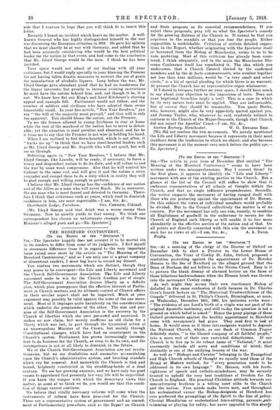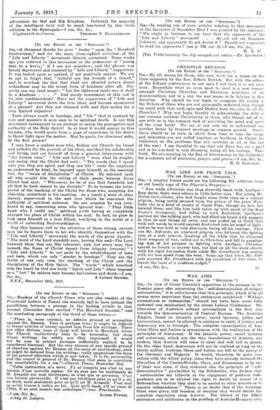(To THE Burros or THE " SPECTA.TOR."3 Ssa,—At a meeting
of the clergy of the Diocese of Oxford on December lith to elect a Proctor to the Lower Homo of Convocation, the Vicar of Cowley St. John, Oxford, proposed a resolution protesting against the appointment of Dr. Hensley Henson to the See of Hereford on the alleged ground that the Dean of Durham did not believe in the Nicene Creed. Easy is it to picture the blank dismay of alarmed horror on the faces of those hilarious backwoodsmen when the Henson bomb was thrown into the sacrosanct Cowley camp.
As well might they accuse their own reactionary Bishop of disbelief in the same confession of faith because in Dr. Charles Gore's fourth lecture on " The Historical Trustworthiness of the Gospels " delivered in St. Philip's Church, Birmingham, at noon, on Wednesday, December 10th, 1902, his ipsissima verba were : " The evidence of our Lord's birth of a virgin was not part of the original Apostolic testimony, and still to-day the question is not a ground on which belief is asked." Hence the puny pipings of those Oxford protestants against the healthy appointment to Hereford come with uncommonly bad grace. They need first to look at home. It would seem as if those intransigents wanted to degrade the National Church, which, as our Book of Common Prayer definitely states, " is the blessed company of all faithful people," into a mere sect of their own restricted didacticisms. If our Church is to live up to its robust name of "National," it must necessarily include all sorts and conditions of mind; that distinctly is one of the unifying lessons of the war.
As well as "Bishops and Curates" belonging to the Evangelical and High Church schools of thought we equally need those of the Broad or Modern outlook, for "every generation needs to be addressed in its own language." Dr. Henson, with his forth- rightness of speech and catholic-mindedness, may be securely trusted to uphold the very best traditions of freedom for the Church in England. His practical Christian attitude towards our nonconforming brethren is a telling asset alike to the Church and the nation. Free minds make brave men, and throughout his ecclesiastical career the Bishop-designate of Hereford has ever preferred the promptings of the Spirit to the line of policy. Clerical Blondinism or ecclesiastical fence-sitting, parsonic trimming or playing for safety, has never appealed to this sturdy adventurer for God and His Kingdom. Certainly the majority of the intelligent laity will be much heartened by this virile addition to the Eptscopate.—I am, Sir, de.,



































 Previous page
Previous page